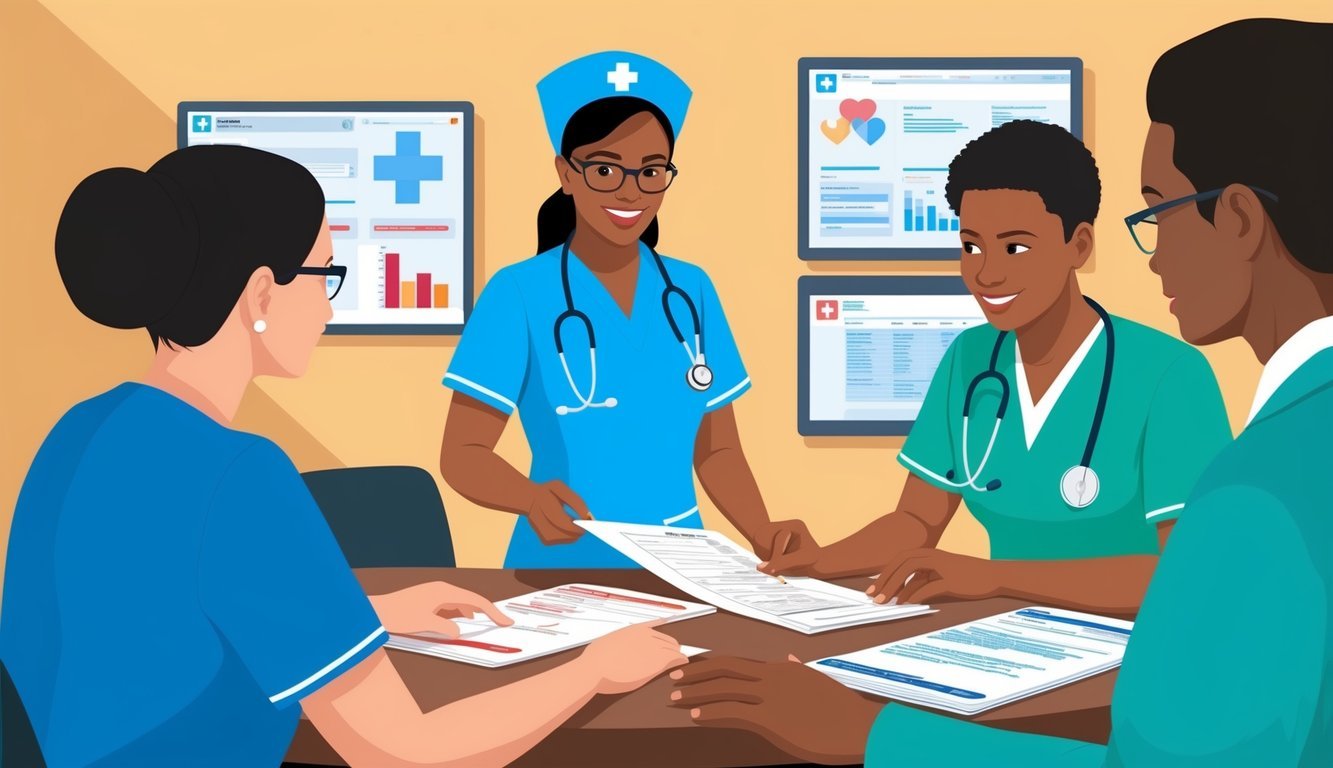Clinical Documentation Improvement (CDI) nurses play a crucial role in today’s healthcare system.
These professionals ensure that patient records are accurate and complete, which directly influences the quality of care patients receive. A CDI nurse reviews patient documentation, educates healthcare providers on best practices, and ensures compliance with regulations.
This makes their role essential for achieving high standards in patient care.
In addition to their vital role, CDI nurses are in demand due to the increased focus on healthcare quality and regulatory compliance.
To excel in this profession, specialized education and certifications are often required, which prepare you to tackle the challenges of clinical documentation.
Staying updated with the latest technologies and methodologies in CDI can enhance your effectiveness and impact within your organization.
Key Takeaways
- CDI nurses ensure accurate and complete patient records.
- Education and certifications are crucial for success in this field.
- Staying current with CDI technologies improves healthcare quality.
Role and Functions of a CDI Nurse

A Clinical Documentation Integrity (CDI) nurse plays a key role in ensuring that medical records accurately reflect patient care and clinical conditions.
This section will explore the importance of CDI, daily responsibilities, and the collaboration required with healthcare professionals.
Understanding CDI and Its Importance
Clinical Documentation Integrity (CDI) is crucial for maintaining accurate medical records.
You ensure that patients’ health journeys are documented completely and correctly.
Accurate documentation impacts patient care, coding for reimbursement, and quality metrics.
When documentation is precise, it reflects the true severity of a patient’s condition, influencing treatment and care decisions.
CDIs are not only responsible for correct diagnosis codes but also for promoting best practices in documentation across the healthcare system.
Your role helps improve compliance with regulations and supports optimal patient outcomes.
Daily Responsibilities and Workflow
Your typical day as a CDI nurse involves a variety of tasks.
You begin with chart reviews to identify areas needing improvement.
You validate diagnosis codes and spot any missing information.
Another aspect of your job is performing concurrent reviews, which means checking records while patients are still being treated.
This helps ensure that documentation aligns with the level of care provided.
You also take time to query physicians when necessary.
This involves asking for more detailed information to clarify the patient’s condition.
Effective communication is key to fulfilling your responsibilities.
Collaboration with Healthcare Professionals
Collaboration is essential to your role as a CDI nurse.
You work closely with various healthcare professionals, including physicians, nurses, and coding specialists.
Meetings with these professionals help to discuss documentation gaps and improve the overall quality of medical records.
You provide training on best documentation practices, which enhances team performance.
Your input ensures that clinical documentation aligns with patient care standards.
By fostering strong relationships with the healthcare team, you help create a culture of accuracy and compliance within the organization.
Effective collaboration ultimately leads to better patient outcomes and a clearer understanding of health information.
Educational Path and Certifications
To work as a CDI nurse, you need a solid educational background paired with specific certifications.
These qualifications help you gain the knowledge and skills necessary for accurate medical documentation and patient assessment.
Required Educational Background
To become a CDI nurse, you typically need a minimum of an associate degree in nursing (ADN) or a bachelor’s degree in nursing (BSN).
Many employers prefer candidates with a BSN because of its comprehensive training.
You must also hold a valid nursing license in your state.
This ensures that you have met the required clinical training and competencies.
Having nursing experience is crucial, as it provides you with insights into patient care and medical terminology.
CDI Specialization and Certifications
Once you have your nursing degree, pursuing specialized certifications is essential.
The Certified Clinical Documentation Specialist (CCDS) credential is one of the most recognized certifications in this field.
This certification demonstrates your skills in clinical documentation and coding processes.
You can also consider the Clinical Documentation Improvement Practitioner (CDIP) certification offered by AHIMA.
These certifications often require candidates to pass an exam and have relevant work experience in clinical documentation.
Additionally, you can attend training programs focused on CDI to further enhance your expertise.
Many organizations, such as AHIMA, provide valuable resources for continuing education and training in clinical documentation integrity.
Advancement Opportunities for CDI Nurses
As a CDI nurse, you can explore several advancement opportunities.
With experience and additional certifications, you may qualify for positions such as a CDI manager or director.
These roles often involve overseeing CDI teams and implementing new documentation policies.
You may also consider specializing further in areas like risk adjustment or healthcare compliance, which can enhance your career prospects.
Continuous education is vital in this field.
Engaging in professional development opportunities will keep you updated on industry changes and help you maintain your certifications.
Organizations like AHIMA offer ongoing CDI training and resources to support your growth in this specialization.
Impact on Healthcare Quality and Compliance

Strong clinical documentation integrity (CDI) is crucial for improving healthcare quality and ensuring compliance with regulations.
This affects how patient care is recorded and reimbursed, impacting both healthcare providers and patients.
Improving Clinical Documentation Integrity
Effective CDI enhances the quality of patient records.
When documentation is accurate and detailed, it supports better clinical decisions and care continuity.
This process involves reviewing health records to confirm they reflect the patient’s clinical status correctly.
A well-implemented CDI program leads to:
- Clear Communication: Improved understanding among the care team.
- Quality Patient Care: Accurate records help avoid misdiagnoses and unnecessary treatments.
Your compliance with regulations is vital.
Proper documentation meets the standards set by Medicare, Medicaid, and private payers, leading to higher-quality healthcare outcomes.
Ensuring Accurate Reimbursement and Compliance
Accurate clinical documentation directly influences reimbursement rates.
If records do not accurately reflect patient care, healthcare providers risk reduced payments or denials from insurers.
Medicare and Medicaid, along with private payers, have specific regulations that must be followed.
Maintaining compliance involves:
- Regular Training: Keeping staff informed about documentation standards.
- Documentation Audits: Reviewing records to ensure accuracy and adherence to payer requirements.
Ensuring that your clinical documentation meets these regulations helps you maintain financial viability and avoid penalties.
This focus on compliance fosters trust between providers and patients, ultimately enhancing the overall healthcare experience.
For more information on compliance standards, visit AHIMA.
CDI Technologies and Tools

In the field of Clinical Documentation Integrity (CDI), technology plays a crucial role.
Two primary aspects are the Electronic Medical Records (EMR) Systems and various CDI software and applications.
These tools enhance accuracy, efficiency, and collaboration among healthcare professionals.
Electronic Medical Records Systems
Electronic Medical Records (EMRs) are vital for modern healthcare.
They store comprehensive patient information digitally, making it easier for you and your colleagues to access medical histories, lab results, and treatment plans promptly.
Key benefits include:
- Improved Accuracy: EMRs reduce the chances of errors compared to paper records.
- Enhanced Communication: Healthcare providers can share notes and updates in real time.
- Streamlined Workflows: Automation speeds up documentation processes and data retrieval.
Popular EMR systems include Epic, Cerner, and Allscripts.
These platforms also have features that simplify compliance with regulations in health information management.
CDI Software and Applications
CDI software and applications are tailored to assist Clinical Documentation Specialists in their work.
These tools offer functions like automated coding, data validation, and reporting.
Notable aspects include:
- Artificial Intelligence: Many applications now use AI to suggest improvements in documentation.
- Clinical Validation: Tools help confirm that diagnoses are accurate and supported by the patient’s medical records.
- Remote Access: With mobile compatibility, you can access important information from your phone or other devices.
Examples of popular CDI software include 3M, Optum360, and Nuance, each specializing in different aspects of documentation and coding.
Such applications enhance your efficiency and accuracy in maintaining quality clinical records.
For more details, explore resources from the Association of Clinical Documentation Integrity Specialists.
Challenges and Best Practices in CDI
Clinical Documentation Improvement (CDI) faces various challenges that can impact healthcare quality and financial performance.
Understanding these challenges and implementing best practices is essential for developing effective CDI programs.
By addressing specific areas such as documentation improvement and claim denials, you can enhance the overall quality of clinical records and ensure compliance with quality reporting standards.
Addressing Common CDI Challenges
CDI specialists often encounter several challenges.
One major issue is incomplete documentation, which can lead to inaccurate claims and potential denials.
It is crucial to ensure that all clinical encounters are thoroughly documented.
Another common challenge is staff training.
Continuous training can become resource-intensive, yet it’s necessary to keep your team updated on guidelines and tools.
Lack of training often results in misunderstandings about documentation requirements.
High staff turnover in healthcare settings can also affect CDI efforts.
When experienced personnel leave, knowledge about best practices may go with them.
Implementing a structured onboarding process for new staff can help mitigate this challenge.
Best Practices for Effective CDI Programs
To enhance your CDI programs, consider adopting the following best practices:
- Standardized Processes: Develop clear guidelines for documentation to ensure consistency across the board.
- Ongoing Education: Provide regular training sessions to keep staff informed of changes in regulations and practices.
- Utilize Technology: Make use of CDI software tools that can support documentation improvement and minimize errors.
- Interdisciplinary Communication: Encourage collaboration among clinicians, coders, and CDI specialists to improve the accuracy of health records.
By focusing on these areas, you can reduce claim denials and improve quality reporting outcomes, ultimately supporting the sustainability of your CDI initiatives.
For further tips, consider resources like the AHIMA Clinical Documentation Integrity program.
Frequently Asked Questions
This section addresses common inquiries about the role of a CDI nurse.
You will find specific information related to becoming a CDI nurse, the job responsibilities, certification requirements, salary expectations, remote work opportunities, and professional development options.
How does one become a CDI nurse?
To become a CDI nurse, you typically need a registered nursing license.
Acquiring experience in clinical settings is essential.
Many nurses choose to pursue specialized training in clinical documentation improvement through workshops or online courses.
What does the role of a CDI nurse entail?
A CDI nurse is responsible for ensuring accurate and complete documentation of patient care.
You will collaborate with physicians and other healthcare providers to improve the quality of clinical documentation.
This role also involves analyzing patient records for compliance and performance improvement initiatives.
What are the certification requirements for a CDI nurse?
To become a certified CDI nurse, you must pass an exam after meeting certain educational criteria.
Many organizations offer certification, such as the Association of Clinical Documentation Improvement Specialists (ACDIS).
You may also need to complete continuing education to maintain your certification.
What is the typical salary range for a CDI nurse?
Salaries for CDI nurses can vary based on experience, location, and healthcare setting.
Typically, you can expect a salary range from $70,000 to $90,000 per year.
Researching local salary data can give you a clearer picture of potential earnings in your area.
What opportunities exist for CDI nurses looking to work remotely?
Remote work options for CDI nurses are growing.
Many healthcare organizations now offer remote CDI positions.
These roles allow you to contribute to clinical documentation efforts from home, providing flexibility while maintaining a vital part of patient care.
What professional development options are available for CDI nurses?
CDI nurses have various options for professional development.
You may choose to attend conferences, webinars, or specialized training sessions focused on clinical documentation improvement strategies.
Professional organizations like ACDIS offer valuable resources to help you stay updated in this evolving field.

